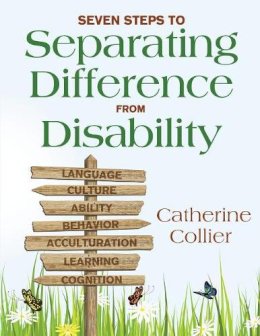
Stock image for illustration purposes only - book cover, edition or condition may vary.
Seven Steps to Separating Difference From Disability
Catherine C. Collier
FREE Delivery in Ireland
Description for Seven Steps to Separating Difference From Disability
paperback. Based on the RTI model, this comprehensive book provides seven steps to determining appropriate instruction, intervention, and services for culturally and linguistically diverse students. Num Pages: 176 pages, Illustrations. BIC Classification: JNSV. Category: (P) Professional & Vocational. Dimension: 279 x 215 x 13. Weight in Grams: 499.
"This is a complete book for practitioners, helping me determine at what stage in the process my child study team is and where we should go next."
—Margarete Couture, Principal, Seneca Central School District, Interlaken, NY
"This book contributes significantly to the body of literature on RTI. No professional library will be complete without this book for addressing the multicultural perspective."
—Karen Kozy-Landress, Speech/Language Pathologist, MILA Elementary School, Merritt Island, FL
Ensure appropriate placement and services for your school′s diverse students!
When a culturally and linguistically diverse (CLD) student struggles in school, how can you tell whether language or cultural differences are ... Read morethe cause, or if the student has a learning or behavioral disability? Because the reason can be difficult to pinpoint, having the right assessment process in place is crucial. Seven Steps to Separating Difference From Disability shows how educators can adapt the widely used Response to Intervention (RTI) model to make sound decisions regarding a student′s education.
Catherine Collier presents a framework that breaks down the process into seven clear steps for determining each student′s unique strengths and needs, helping educators make appropriate decisions regarding resources, referrals, and integrated services. Principals, school administrators, and RTI team members will find:
- Instruction, intervention, and assessment techniques specific to the challenges faced by limited-English-proficient (LEP) students and English language learners (ELLs)
- A step-by-step process that works within an RTI framework, supporting collaboration among teachers, specialists, and administrators
- Realistic, research-based guidance on key considerations such as cognitive learning style, language acquisition, acculturation, and the role of family and community
- A running case study that demonstrates the book′s strategies in action
Develop your team′s ability to distinguish between learning differences and disabilities so you can better serve all students!
Show Less
Product Details
Publisher
Corwin United States
Place of Publication
Thousand Oaks, United States
Shipping Time
Usually ships in 15 to 20 working days
About Catherine C. Collier
Learn more about Catherine Collier′s PD offerings Catherine Collier, Ph.D. has over 45 years experience in equity, cross-cultural, bilingual, and special education. Dr. Collier is a nationally recognized expert on diverse learners with learning and behavior needs. She established and directed the Chinle Valley School, Dine Bitsiis Baa Aha Yaa, bilingual services for Navajo students with severe and ... Read moremultiple disabilities for the Navajo Nation. She was the director of a teacher-training program, Ikayurikiit Unatet for the University of Alaska for seven years, preparing Yup’ik Eskimo paraprofessionals for certification as bilingual preschool, elementary, and special educators. She was an itinerant (diagnostician/special education) for Child Find in remote villages in Alaska. For eight years, Dr. Collier worked with the BUENO Center for Multicultural Education, Research, and Evaluation at the University of Colorado, Boulder, where she created and directed the Bilingual Special Education Curriculum/Training project (BISECT), a nationally recognized effort. She is active in social justice activities for culturally and linguistically diverse learners and families. She started the first bilingual special education programs for the Navajo Nation and the White Mountain Apache. She is currently the director of the national professional development project Curriculum Integration for Responsive, Crosscultural, Language Education (CIRCLE) at Western Washington University. She works extensively with school districts on professional and program development for at-risk diverse learners. Dr. Collier provides technical assistance to university, local, and state departments of education regarding programs serving at-risk cognitively, culturally and linguistically diverse learners. She works with national organizations to provide professional development in the intersection of crosscultural, multilingual, diversity, special needs issues in education. Show Less
Reviews for Seven Steps to Separating Difference From Disability
“The book is particularly useful to educators because it offers in-depth information about the influence of language and cultural differences. This helpful resource also outlines school-aged children′s and adolescents′ response to acculturation based on educators’ perceptions and expectations of these individuals’ school success.”
Joyce Williams Bergin, Professor and Assistant Dean, College of Education “This book is timely and an ... Read moreimportant resource for all schools with diverse populations to have in their professional libraries and in their Child Study Team rooms. This book would also be a complete text to use in an ESOL certification class devoted to planning interventions for students of concern.”
Karen Kozy-Landress, Speech/Language Pathologist “This is a complete guide for practitioners. I would be able to pick up the book and determine my child′s stage in the study team process and where we should go next. Each step in the book stands alone as a reference.”
Margarete Couture, Principal “This book offers a detailed, easy-to-follow approach to determining the needs of students who are having difficulty learning, including assessments and interventions. I am putting the knowledge I obtained to good use, and will continue to use it as a reference."
Kay Kuenzl-Stenerson, Literacy Coach Show Less

